John Deere 2510H Nutrient Applicator
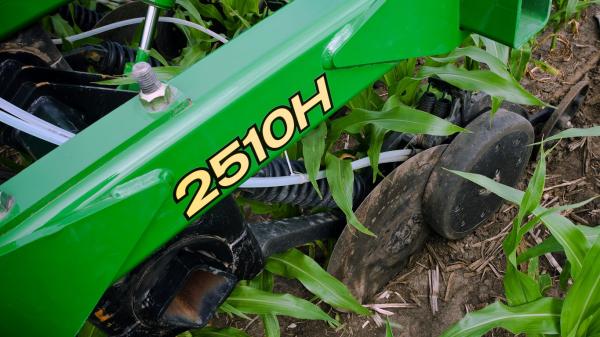
| Make | John Deere |
| Model | 2510H |
| Type | Application Toolbars |
Your Preferred Location
Description
- Single disk opener
- Speeds up to 10 mph
- Low soil disturbance allows sidedressing right after planting to 30-inch tall corn
Models
Ski eliminates bull dozing and increases productivity
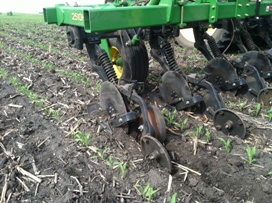 2510H High-Speed Applicator with optional ski
2510H High-Speed Applicator with optional ski
The optional ski on the 2510H High-Speed Applicator takes the place of the gauge wheel on the opener. The ski helps eliminate bull dozing of loose soil and residue in heavy primary-tillage conditions.
Images of 2510H High-Speed Applicator in action
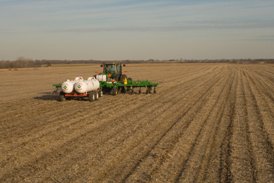 Fall application in soybean stubble
Fall application in soybean stubble
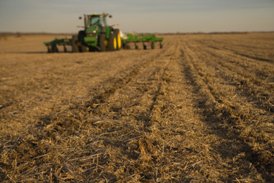 Field finish in soybean stubble
Field finish in soybean stubble
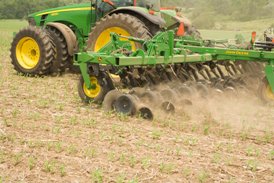 Side-dress application
Side-dress application
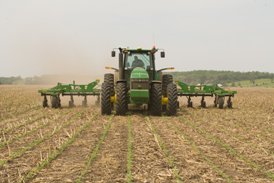 Side-dressing in corn stubble
Side-dressing in corn stubble
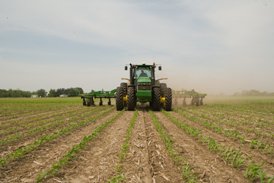 Side-dress application
Side-dress application
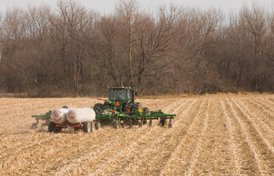 Drawn hitch in corn stubble
Drawn hitch in corn stubble
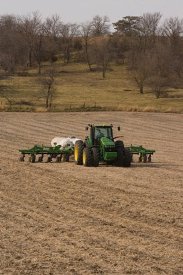 Fall application with drawn hitch
Fall application with drawn hitch
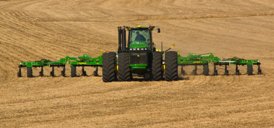 23-row fall application in soybean stubble
23-row fall application in soybean stubble
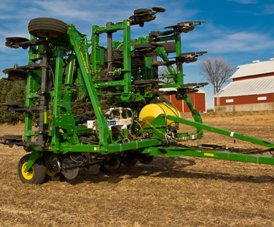 23-row folded for transport
23-row folded for transport
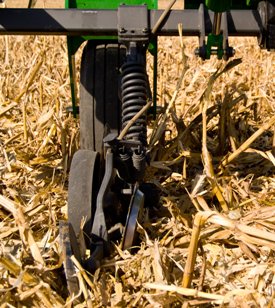 Anhydrous application in corn stubble during fall
Anhydrous application in corn stubble during fall
Equipped with multiple safety features
The 2510H is equipped for safe operation and safe transport with the following base equipment:
- Slow-moving-vehicle emblem
- Hitch safety chain
- Implement warning lights
- Reflective decals
Why a single-disk opener?
Productivity
In many areas, a conventional anhydrous application is a pass through the field at 8 km/h to 12 km/h (5 mph to 7.5 mph). To increase productivity, a few options are available:
- Increase the operating speed, which is not always possible due to horsepower limitations, and at the same time keep the knife from tripping up or soil disturbance at faster speeds
- Operate a wider applicator, which also requires more horsepower
The 2510H’s single-disk opener design has a lower draft requirement and allows anhydrous application up to 16 km/h (10 mph).
For example, an 8530 Tractor coupled with a 15-row opener 2510H can cover up to 40 acres per hour at a 16-km/h (10-mph) operating speed.
Low soil disturbance
 Fall application in soybean stubble
Fall application in soybean stubble
The single-disk opener on the 2510H utilizes a 559-mm (22-in.) blade that is angled 4 degrees to open a narrow slot for anhydrous application.
Reduced soil and residue disturbances provide a increased accuracy and placement during anhydrous application:
- In highly erodible land areas
- With no-till/min-till practices
- Looking to save money side-dressing with anhydrous application
Side-dress opportunity
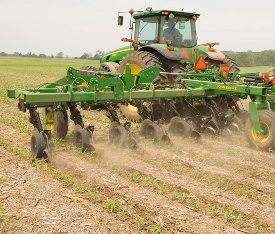 Side-dressing in soybean stubble
Side-dressing in soybean stubble

Productivity and low soil disturbance are two of the three ingredients for a successful side-dress application. The third is clearance under the frame and around the wheel modules.
Certain challenges exist when side-dressing using a conventional applicator:
- Very short window
- Soil disturbance
- Crop clearance
Early side-dress application with a conventional applicator can cause too much soil throw and damage or small corn plants. With a single-disk opener, soil disturbance is very low for early side-dressing, as early as right after planting.
As the season progresses and the corn gets taller, underframe clearance becomes vitally important to side-dressing using anhydrous application. The underframe clearance on the 2510H is 762 mm (30 in.) and there are no tandem wheel axles with low clearance. The 2510H increases the side-dress window by nearly 300 percent.
The 2510H has configurations for off-row and on-row fertilizer banding in 16-row configurations. With a working width of 12.2 m (40 ft), the 16-row 2510H can be used for pre-planting and fall applications to apply on row. This allows for better matching of the tracks from application with subsequent tasks like planting. It also makes execution of banding easier.
The 2510H High-Speed Applicator is truly a three-season machine: fall, spring, and side-dressing.
Improve wear, residue flow, and sealing with floating scraper
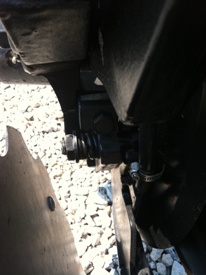 Floating scraper
Floating scraper
The floating scraper offered on 2510H High-Speed Applicators improves wear by allowing the scraper to float and flex along the blade during application. Instead of a rigid mount, the scraper has a spring pack that floats with the blade. This increases the wear life of the scraper assembly.
The floating scraper also improves residue flow in high-residue conditions. Keeping the scraper in constant contact with the opener eliminates residue from getting caught between the scraper and the blade.
A high-wear beaver tail extension is also available on the floating scraper for the 2510H Applicator. The beavertail extension helps improve sealing in various conditions.
Transport dimensions and horsepower requirements
| Size with 762-mm (30-in.) spacing |
Transport width | Transport height | Engine horsepower requirements |
| 11 opener | 5.64 m |
3.35 m (11 ft) |
11.2 kW to 18.6 kW (15 to 25 hp) per opener |
| 15 opener | 5.64 m |
3.35 m (11 ft) |
11.2 kW to 18.6 kW (15 to 25 hp) per opener |
| 16 opener | 5.64 m |
3.66 m (12 ft) |
11.2 kW to 18.6 kW (15 to 25 hp) per opener |
| 23 opener | 5.49 m (18 ft) |
3.35 m (13 ft) |
11.2 kW to 18.6 kW (15 to 25 hp) per opener |
Shallow placement during anhydrous application allows for minimal soil disturbance
Traditional thinking is that anhydrous ammonia must be placed 203 mm (8 in.) deep in the soil. The 2510H High-Speed row unit places anhydrous applications at 114-mm (4.5-in.) depth, which is quite a difference from traditional thinking.
John Deere has tested this placement across the Corn Belt in real-world field applications and plot-size treatments. More than 10000 acres of spring pre-plant anhydrous ammonia application yielded no reports of seedling damage.
To further evaluate shallow placement, plot-scale studies were initiated with three university cooperators that put the concept to the test by planting right over the anhydrous application track seven days after application.
To avoid seedling damage with the 2510H, the same recommendations apply as when using a conventional shank applicator:
- Allow a window of opportunity
- Apply to the rows at an angle
- Soil moisture conditions
Retention at a shallow depth
John Deere has gone to great lengths to verify the anhydrous application retention provided by a 2510H is equal to that of a shank at a shallow depth.
Three methods were used to measure retention.
The brick soil sampling method entailed extracting a brick of soil in the injection zone 24 hours after application and then sent off to a lab for analysis. A side-by-side comparison of the 2510H with a conventional shank revealed equal retention.
The other two methods were the litmus paper test and the chamber technique to collect emissions.
All three methods revealed equal retention with a shank applicator.
Three-year warranty offered on 2510H
The three-year warranty on the 2510H covers:
- All frame members including wheel modules (weldments and tubes), wing-fold components, and the front hitch
All other components (disk standards, hydraulics, electronics, and safety lights) and attachments, such as rear hitches, are under warranty for one year as the warranty definition has not changed. The same exclusions and administration as defined in the Warranty Administration Manual applies.
The following items are not under warranty:
- Wear items such as blades, pins, hinges, hitch link, and hub
- Breakage due to rocks
- Abuse or lack of maintenance
- Use of unapproved attachments such as tanks and rear hitches by other manufacturers
- Failure to follow operator's manual recommendations
Features
-
Season: Pre-plant
Post-harvest
In-season - Engine hp Needed: 15-25 hp/row
- Number of Rows: 11, 15, 23
Copy Set
Ski eliminates bull dozing and increases productivity
 2510H High-Speed Applicator with optional ski
2510H High-Speed Applicator with optional ski
The optional ski on the 2510H High-Speed Applicator takes the place of the gauge wheel on the opener. The ski helps eliminate bull dozing of loose soil and residue in heavy primary-tillage conditions.
Images of 2510H High-Speed Applicator in action
 Fall application in soybean stubble
Fall application in soybean stubble
 Field finish in soybean stubble
Field finish in soybean stubble
 Side-dress application
Side-dress application
 Side-dressing in corn stubble
Side-dressing in corn stubble
 Side-dress application
Side-dress application
 Drawn hitch in corn stubble
Drawn hitch in corn stubble
 Fall application with drawn hitch
Fall application with drawn hitch
 23-row fall application in soybean stubble
23-row fall application in soybean stubble
 23-row folded for transport
23-row folded for transport
 Anhydrous application in corn stubble during fall
Anhydrous application in corn stubble during fall
Equipped with multiple safety features
The 2510H is equipped for safe operation and safe transport with the following base equipment:
- Slow-moving-vehicle emblem
- Hitch safety chain
- Implement warning lights
- Reflective decals
Why a single-disk opener?
Productivity
In many areas, a conventional anhydrous application is a pass through the field at 8 km/h to 12 km/h (5 mph to 7.5 mph). To increase productivity, a few options are available:
- Increase the operating speed, which is not always possible due to horsepower limitations, and at the same time keep the knife from tripping up or soil disturbance at faster speeds
- Operate a wider applicator, which also requires more horsepower
The 2510H’s single-disk opener design has a lower draft requirement and allows anhydrous application up to 16 km/h (10 mph).
For example, an 8530 Tractor coupled with a 15-row opener 2510H can cover up to 40 acres per hour at a 16-km/h (10-mph) operating speed.
Low soil disturbance
 Fall application in soybean stubble
Fall application in soybean stubble
The single-disk opener on the 2510H utilizes a 559-mm (22-in.) blade that is angled 4 degrees to open a narrow slot for anhydrous application.
Reduced soil and residue disturbances provide a increased accuracy and placement during anhydrous application:
- In highly erodible land areas
- With no-till/min-till practices
- Looking to save money side-dressing with anhydrous application
Side-dress opportunity
 Side-dressing in soybean stubble
Side-dressing in soybean stubble

Productivity and low soil disturbance are two of the three ingredients for a successful side-dress application. The third is clearance under the frame and around the wheel modules.
Certain challenges exist when side-dressing using a conventional applicator:
- Very short window
- Soil disturbance
- Crop clearance
Early side-dress application with a conventional applicator can cause too much soil throw and damage or small corn plants. With a single-disk opener, soil disturbance is very low for early side-dressing, as early as right after planting.
As the season progresses and the corn gets taller, underframe clearance becomes vitally important to side-dressing using anhydrous application. The underframe clearance on the 2510H is 762 mm (30 in.) and there are no tandem wheel axles with low clearance. The 2510H increases the side-dress window by nearly 300 percent.
The 2510H has configurations for off-row and on-row fertilizer banding in 16-row configurations. With a working width of 12.2 m (40 ft), the 16-row 2510H can be used for pre-planting and fall applications to apply on row. This allows for better matching of the tracks from application with subsequent tasks like planting. It also makes execution of banding easier.
The 2510H High-Speed Applicator is truly a three-season machine: fall, spring, and side-dressing.
Improve wear, residue flow, and sealing with floating scraper
 Floating scraper
Floating scraper
The floating scraper offered on 2510H High-Speed Applicators improves wear by allowing the scraper to float and flex along the blade during application. Instead of a rigid mount, the scraper has a spring pack that floats with the blade. This increases the wear life of the scraper assembly.
The floating scraper also improves residue flow in high-residue conditions. Keeping the scraper in constant contact with the opener eliminates residue from getting caught between the scraper and the blade.
A high-wear beaver tail extension is also available on the floating scraper for the 2510H Applicator. The beavertail extension helps improve sealing in various conditions.
Transport dimensions and horsepower requirements
| Size with 762-mm (30-in.) spacing |
Transport width | Transport height | Engine horsepower requirements |
| 11 opener | 5.64 m |
3.35 m (11 ft) |
11.2 kW to 18.6 kW (15 to 25 hp) per opener |
| 15 opener | 5.64 m |
3.35 m (11 ft) |
11.2 kW to 18.6 kW (15 to 25 hp) per opener |
| 16 opener | 5.64 m |
3.66 m (12 ft) |
11.2 kW to 18.6 kW (15 to 25 hp) per opener |
| 23 opener | 5.49 m (18 ft) |
3.35 m (13 ft) |
11.2 kW to 18.6 kW (15 to 25 hp) per opener |
Shallow placement during anhydrous application allows for minimal soil disturbance
Traditional thinking is that anhydrous ammonia must be placed 203 mm (8 in.) deep in the soil. The 2510H High-Speed row unit places anhydrous applications at 114-mm (4.5-in.) depth, which is quite a difference from traditional thinking.
John Deere has tested this placement across the Corn Belt in real-world field applications and plot-size treatments. More than 10000 acres of spring pre-plant anhydrous ammonia application yielded no reports of seedling damage.
To further evaluate shallow placement, plot-scale studies were initiated with three university cooperators that put the concept to the test by planting right over the anhydrous application track seven days after application.
To avoid seedling damage with the 2510H, the same recommendations apply as when using a conventional shank applicator:
- Allow a window of opportunity
- Apply to the rows at an angle
- Soil moisture conditions
Retention at a shallow depth
John Deere has gone to great lengths to verify the anhydrous application retention provided by a 2510H is equal to that of a shank at a shallow depth.
Three methods were used to measure retention.
The brick soil sampling method entailed extracting a brick of soil in the injection zone 24 hours after application and then sent off to a lab for analysis. A side-by-side comparison of the 2510H with a conventional shank revealed equal retention.
The other two methods were the litmus paper test and the chamber technique to collect emissions.
All three methods revealed equal retention with a shank applicator.
Three-year warranty offered on 2510H
The three-year warranty on the 2510H covers:
- All frame members including wheel modules (weldments and tubes), wing-fold components, and the front hitch
All other components (disk standards, hydraulics, electronics, and safety lights) and attachments, such as rear hitches, are under warranty for one year as the warranty definition has not changed. The same exclusions and administration as defined in the Warranty Administration Manual applies.
The following items are not under warranty:
- Wear items such as blades, pins, hinges, hitch link, and hub
- Breakage due to rocks
- Abuse or lack of maintenance
- Use of unapproved attachments such as tanks and rear hitches by other manufacturers
- Failure to follow operator's manual recommendations

